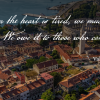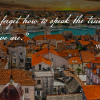
Published in early 1998, this issue of Cirkular captures a tense moment in Balkan history when the scars of war were still fresh and the world’s attention was shifting toward Kosovo. Through international news excerpts and the powerful words of Valentina Krčmar, it tells a story of courage, truth, and the relentless pursuit of justice.
This summary is based on the original Cirkular No. 7 newsletter, published in 1998. You can read or download the full issue here: Cirkular-7.pdf
The Storm Before the Fire: NATO Secrets and British Scandal
The newsletter opens with a striking report from The New York Times about Major Milos Stankovic, a British army officer accused of leaking NATO intelligence to Bosnian Serb leaders during the war.
Operating under the alias Michael Stanley, Stankovic had close ties to the Serb side, serving as a liaison between UN commanders and the Bosnian Serb authorities, including Ratko Mladić and Radovan Karadžić, both indicted for war crimes.
The case divided British and UN officials and revealed deep internal conflicts within the peacekeeping mission. Some commanders were openly sympathetic to the Serbs, while others pushed for a harder stance. The revelations were both scandalous and symbolic, showing how blurred loyalties and quiet biases shaped the UN’s role in Bosnia.
Kosovo Erupts: The Next Flashpoint of War
By March 1998, the violence had shifted south to Kosovo. A series of Toronto Star articles chronicled the brutal crackdowns carried out by Slobodan Milošević’s regime as Serbian police attacked Albanian villages and separatists.
Headlines read like a timeline of tragedy:
“Defiant Serbs Pound Kosovo”
“Kosovo Guerilla Boss Killed”
“Serb Police Crack Down on Villagers”
“Major Powers Demand Urgent Action on Kosovo.”
The tone was ominous. Thousands of civilians hid in forests, homes were burned, and the West issued threats but took no immediate action. It was clear another war was on the horizon.
History Repeats: Debunking the “Holy Soil” Myth
An opinion piece by journalist Eric Margolis in The Toronto Sun offers context for the conflict. He explains how Serbian nationalists claim Kosovo as “holy ground,” the site of their legendary defeat by the Ottomans in 1389.
But Margolis exposes the myth for what it is, propaganda rooted in selective memory. Historically, Serbia’s rulers later allied with the Ottoman Turks rather than fighting them. Despite the rhetoric of defending Christianity, Serbian leaders helped expand Ottoman influence in the region.
Margolis argues that this pattern of mythmaking and ethnic chauvinism has fueled violence for centuries, pointing to post–World War II massacres of Albanians and the ongoing effort to make Kosovo “Albanian-free.”
Behind the Prison Walls: Valentina Krčmar’s Call for Justice
The heart of this issue is an editorial written by Valentina Krčmar titled “What Is Happening in Serbia’s Prisons?”
Krčmar exposes disturbing reports that Croatian prisoners of war were still being held in Serbian prisons years after the fighting had ended. The Yugoslav government officially denied this, claiming that only “spies” remained incarcerated.
Yet witnesses and journalists, including sources from Globus, described something far darker: Croats used as forced labourers, women as sexual slaves, and secret camps never visited by the Red Cross.
Krčmar’s outrage is palpable. She condemns the International Committee of the Red Cross (ICRC) for its silence, accusing it of hiding behind neutrality while people suffered. She argues that neutrality in the face of injustice becomes complicity.
The World’s Indifference: When Neutrality Becomes Complicity
Krčmar’s criticism extends beyond the ICRC to the United Nations and Western powers whose inaction, she says, allowed injustice to thrive.
Quoting from David Rieff’s The Slaughterhouse, she illustrates how UN officials grew desensitized to the suffering of Croats and Bosnians, some even blaming the victims for their own pain.
Her words are a searing indictment of the world’s hypocrisy. She asks how it is possible that a few dead Americans in Somalia were mourned worldwide, while hundreds of thousands of Bosnians and Croats were forgotten.
Her essay is both a political statement and a moral outcry, demanding that humanitarian organizations confront their own failings and take responsibility for the lives still hanging in limbo.
A Nation’s Plea: “Goodbye, Proud World…”
The newsletter closes on a haunting but hopeful note. Krčmar quotes Višnja Milas-Matutinović, who wrote, “Goodbye proud world! I am going home; thou art not my friend.”
It’s a line heavy with resignation, yet Krčmar refuses to end in despair. She turns it into a rallying cry, urging Croatians and allies worldwide to fight for those still imprisoned, lost, or silenced.
Her final plea is urgent and human: to remember, to act, and to ensure that truth outlives indifference.
Final Reflection
Cirkular No. 7 is more than a newsletter. It is a record of moral courage. Through journalism, testimony, and personal conviction, it documents how lies, myths, and silence can sustain injustice long after the fighting stops.
Valentina Krčmar’s words echo through time, reminding us that peace without truth is fragile and neutrality without compassion is empty.




